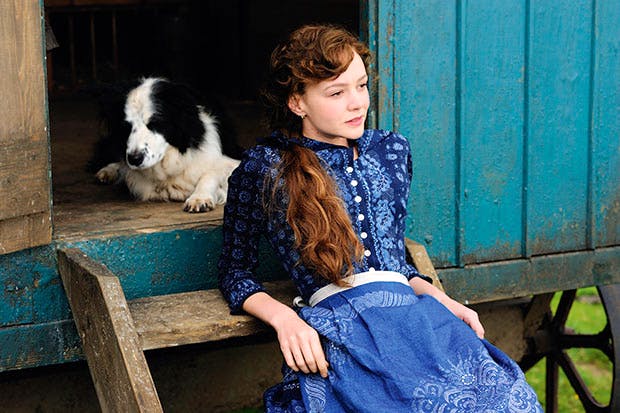Firstly, a message to all Marvel fanboys: there is nothing for you here. Nothing. No CGI, no endless battles, no superheroines with their boobs on show, no deafening soundtrack and no Andy Serkis popping up for reasons I still can’t fathom, and don’t care to fathom anyhow. So go away and heckle someone else, unless you want to stick around, in which case, be warned: this is a proper film with proper acting and it even comes with a proper story that makes proper sense. Some films are like this, you know.
This adaptation of Thomas Hardy’s novel is directed by Thomas Vinterberg, scripted by David Nicholls, and stars Carey Mulligan and Matthias Schoenaerts, the hunk du jour who is everywhere at present. (He was the hot Nazi in Suite Française and the hot gardener in A Little Chaos and now he’s a hot shepherd; it must be that special sort of hotness capable of dealing with any occupation thrown at it.) Inevitably, this will be compared with John Schlesinger’s 1967 version, starring Julie Christie and Alan Bates, and there will be dark mutterings, but can someone not have another go, even after nearly half a century? And why do they have to be in competition? Can’t they coexist? There is only one question worth asking here and it is: does this work in and of itself? And now, having asked the question, I will answer it: yes. It has its flaws — the character of Fanny Robin is underwritten; it is so truncated that even the famous fairground scene has been ejected — but I always felt involved. Odd, when you consider no Russian-accented villains intent on global domination are featured, but some films are like this too.
It’s told at a cracking pace. So much so that, within the first two minutes, Gabriel Oak (Schoenaerts), a farmer, has proposed to Bathsheba Everdene (Mulligan), who is staying with her aunt on a neighbouring farm and, as is the way with Hardy, you desperately long to intervene. (Say ‘yes’, Bathsheba! It will save no end of trouble! And don’t sell your wife! No, that’s the other one!) He is also ruined within the first two minutes. The dog, and that business with the sheep. I can’t even spell it out, it’s so heartbreaking. She then inherits a farm from her uncle, and employs Oak as her shepherd. Schoenaerts is Belgian and his British accent is quite come and go — he doesn’t even attempt a Dorset one — but I didn’t find that mattered. His job is to be Oak by name and Oak by nature: that is, big, dependable, strong, as well as morally indestructible, and he is all that. Plus, there’s that special hotness, and while Bathsheba takes her time to wake up to this, I was on it from pretty early on.
Bathsheba is spirited, as they say, and independent and sometimes perverse, but always stylish (never the same outfit twice, I noted) and, as written here, she manages to seem both of the 19th century and modern. ‘I don’t want to be some man’s property,’ she tells Gabriel, when she turns him down. She is, of course, not short of admirers. There is Mr Boldwood (Michael Sheen) her neighbour, who becomes infatuated with her after she sends him a Valentine card as a prank, and with whom she capriciously flirts. He is not meant to be much good at flirting back. ‘I have some interesting pigs,’ he tells her, although as I am interested in pigs, and would be very interested in interesting pigs, this would not be a deal-breaker for me. Sheen plays Boldwood with tremendous sympathy, conveying a wealthy and awkward man who is so unbearably lonely and repressed that to have hope, and then see that hope curdle, has to be too much.
But it is the third suitor, Sergeant Troy (Tom Sturridge), who finally captures her interest. Troy arrives in a scarlet soldier’s uniform, like an exotic bird, amidst all the earthy tones. (Gabriel dresses as from the Toast catalogue; all very brown and smocky). Again, we are desperate to intervene. (Don’t marry him! He’s no good!) But vanity is her weakness, and he is a flatterer, and she is overwhelmed by sexual desire. You can feel it stirring within her. The other famous scene, the sabre scene – which, in this instance, takes place in a wood rather than on the moors – is absolutely the foreplay it is intended to be. But the underwriting of Fanny (Juno Temple) is something of a problem here. Troy cries over her a lot, but we never quite get why. (Pull your socks up, man!)
Still, Mulligan is a very fine actress. Aside from her face being one of those faces you just want to keep looking at, she adds heft to a character who might otherwise simply be changeable, and also ably portrays the journey of a woman who has everything going for her apart from the one facet she must acquire: wisdom. It is also beautifully filmed, offering a vivid sense of both time and place as the camera scans the rugged beauty of the rural landscape, but mostly it is what you want any drama to be: involving. And to think, not a glowing sceptre in sight. Who’d have thought?
Got something to add? Join the discussion and comment below.
Get 10 issues for just $10
Subscribe to The Spectator Australia today for the next 10 magazine issues, plus full online access, for just $10.














Comments
Don't miss out
Join the conversation with other Spectator Australia readers. Subscribe to leave a comment.
SUBSCRIBEAlready a subscriber? Log in